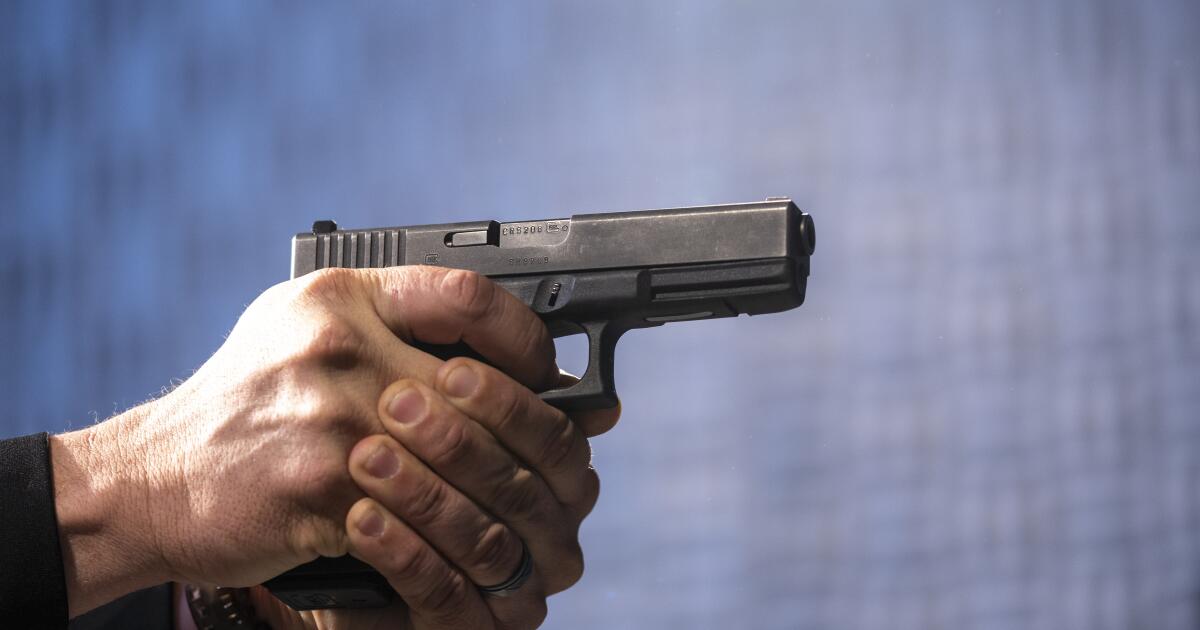NRA sues California over alleged Glock ban aimed at illegal machine gun ‘switches’
SACRAMENTO — Gun rights organizations filed a lawsuit Tuesday challenging a new California law that bans certain types of Glock-style semiautomatic firearms.
The law, signed by Gov. Gavin Newsom last week, prohibits the sale of semiautomatic pistols with a “cruciform trigger bar” — a feature that allows gun owners to attach a device, commonly called a switch, that boosts the weapon’s firepower and converts it into a machine gun capable of spraying dozens of bullets in a fraction of a second.
“Newsom and his gang of progressive politicians in California are continuing their crusade against constitutional rights,” John Commerford, executive director of the National Rifle Association Institute for Legislative Action, said in a statement. “They are attempting to violate landmark Supreme Court decisions and disarm law-abiding citizens by banning some of the most commonly owned handguns in America.”
The lawsuit, filed in the U.S. District Court for the Southern District of California, alleges the law violates the 2nd Amendment. Plaintiffs include the NRA, Firearms Policy Coalition, and the Second Amendment Foundation, as well as some individuals and smaller businesses.
The legal action alleges that California’s new law essentially bans the sale of certain Glock-brand handguns and others with similar features that allow modification by owners.
“A law that bans the sale of — and correspondingly prevents citizens from acquiring — a weapon in common use violates the Second Amendment,” the lawsuit states. “Semiautomatic handguns with cruciform trigger bars are not different from any other type of semiautomatic handgun in a constitutionally relevant way. The Supreme Court has already held that handguns are in common use and cannot be banned.”
The lawsuit states the only justification for banning a firearm is when the weapon is “dangerous and unusual” and argues that semiautomatic pistols are neither.
“They are also unquestionably in common use for lawful purposes,” the lawsuit states. “In fact, they are among the most popular handguns in the nation.”
Assemblymember Jesse Gabriel, who introduced Assembly Bill 1127, said his bill was intended to help protect communities from gun violence.
“Automatic weapons are exceptionally lethal and capable of firing hundreds of rounds per minute; they are illegal in California,” he told the Senate Public Safety Committee in July. “Unfortunately, some semiautomatic firearms feature a dangerous design element allowing them to be converted to automatic weapons through the attachment of an easy-to-use device known as a switch.”
Over the last few years, handguns retrofitted with switches were used in several prominent shootings in California, including the 2022 mass shooting in downtown Sacramento that left six people dead and a dozen injured.
Machine gun conversion switches are illegal in the United States and are mostly manufactured overseas. They also can be built at home using 3D printers. Instructions for installing one on a firearm can be found online and require little to no technical expertise.
The Bureau of Alcohol, Tobacco, Firearms and Explosives reported a 570% increase in the number of conversion devices collected by police departments between 2017 and 2021, according to the Associated Press.


